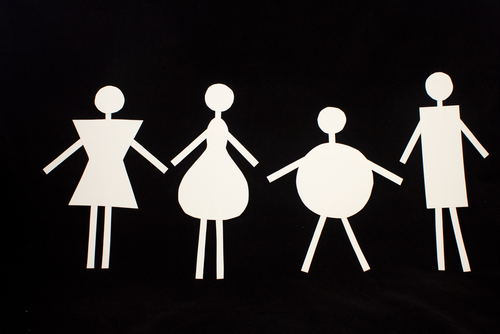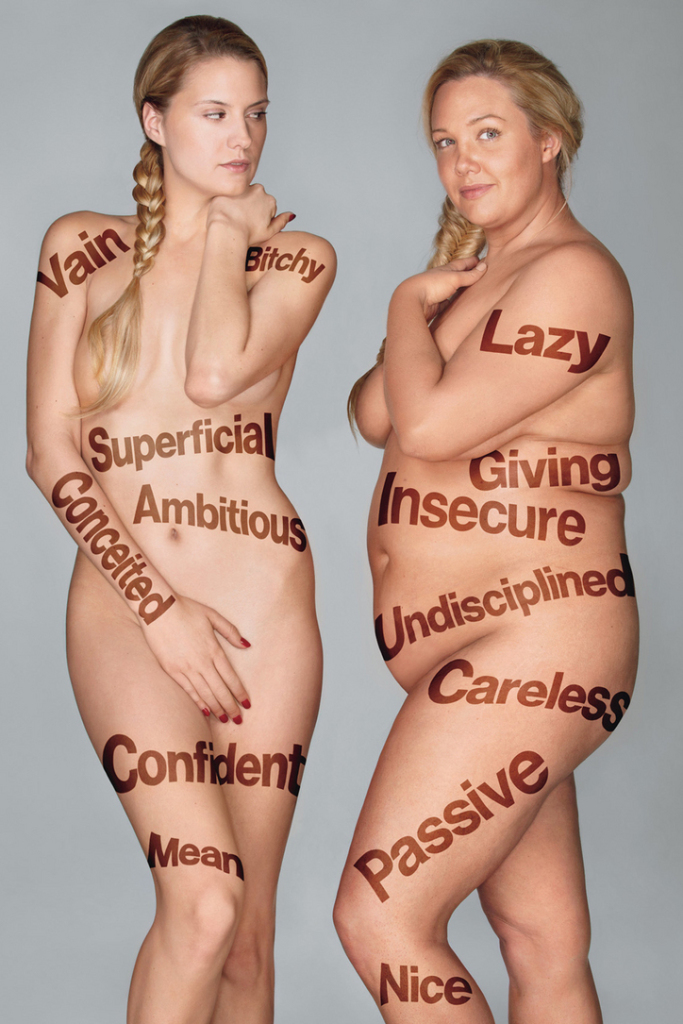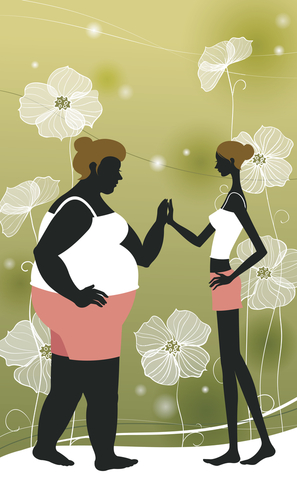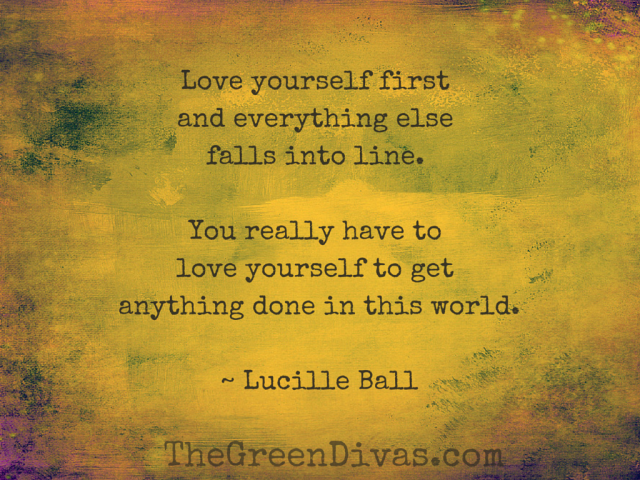
Written by Tanya Lee Markul.
Eating Life Series: Weight Stereotyping
Catch yourself weight stereotyping lately? Why we do it? How do we stop it?
All right—I’ve had a destructive, restrictive, productive and in-progress transformative relationship with food. I didn’t know how to nourish myself for years.
And for even more years I turned to food for problem solving and emotional medication—all of this goes back at least two decades, but for this article’s sake, let’s rewind to just seven years ago.
I met a guy at a café called Pussy Galore’s. It’s no surprise that both of us enjoy old James Bond films, especially the ones starring Sean Connery. And don’t even get us started about that brilliant Q.
Anyway, I got into a relationship seven years ago that I admit, influenced my intake of food—both positively and a little ridiculously. Over the course of a couple years, I acquired the relationship freshman fifteen. Who could resist the powers of young love? Hands meeting in the popcorn bowl, an offering of a sexy dinner, something sugary and full of calories after… reading. And, he bakes. Seriously.
He’s one of the healthiest eaters I ever met and he doesn’t even know how good he is. It just comes naturally. What a jerk.
He eats—a lot and whenever he wants to. He stops when he’s full and he has a brilliant range and balance of everything. He exercises, does yoga and doesn’t finish his dessert if he’s full. What he doesn’t know is how hard it has been for my crazy brain to handle his eating freedom, his healthy way of stopping, let alone his inability to gain weight. Damn.
I always laugh with a friend about how we can find a way to transfer his parasite to our bodies.
You see, for years and years and years, I’ve put myself on regimens, on programs and plans for eating optimally aka normally. Some worked, most didn’t, but none—not a single one of them—set me free.
During most of this time, I was eating because it was a designated time to eat and not because I was hungry (although sometimes I was completely starving). What this left me with was a huge disconnection to what and how I was eating. When I did eat, I mostly ate my cravings—there’s a big difference between responding to cravings and actual hunger.
Over time, I discovered that there was one thing that could set me free, but more of this topic will come in Part II of Eating Life Series: I just don’t want to be fat {sad} anymore.
What I want to get into today is the shape of our bodies and how it generally impacts our perceptions of others and how it can be limiting to connecting or receiving some of life’s vital information.

Have you forgotten to see the human being inside?
The kicker—is the shape you’re trying to fit into truly yours or is it someone else’s? Who gave you this information and how does this impact how you see yourself and others?
Discrimination for being too thin, not thin enough, thin, obese and over-weight is all too relevant and well-documented in today’s society. Nothing really seems to be accepted, but thin typically trumps everything, right?
Size stereotyping extends to women and men of all sizes—we judge, make opinions and assumptions about people’s lives, personality and even intelligence based on their weight.
The image below displays a poll shared in Glamour of 1,800 women ages 18-40 asking participants to imagine a women they had never met before, knew nothing about and got a set of words to choose from to describe her. The word neither was also a choice, but selected by less than half of the respondents.
Here are the results:

Is this news to you? A realization?
Skinny Witch vs. Chubby Fairy.
What do you see and feel when you look at people? Are you limited to shapes?
We all have been programmed to a certain extent to place adjectives and hold opinions regarding people’s bodies. I know that even by investigating this issue, I had to face some of my own and was surprised by what defaults I had been holding onto. All of which, I must note, stem from how I feel about myself.
I wanted to use Glamour’s study to find out what the people around me thought, so I did my own little inventory. I asked 15 random people ages 18-35 how they would describe a particular body shape (male or female) with an adjective.
Here goes:
Super thin: eating disorder, unhealthy, model, female, stuck up, self-centered, obsessive, bitchy, taking drugs
Thin: sporty, athletic, healthy, active, happy, intelligent, reliable, outgoing, youthful, wealthy
A little overweight: just had a baby, in a relationship, working too much, has children, middle-aged, blue-collar, funny, a drinker
Obese: limited, lazy, depressed, alone, poor, unintelligent, diseased, sick, over-eating
Are these fair? Are they realistic? How do these compare to your own weight-shaping stereotypical adjectives?
Here’s a question that will really wet your whistle: Have we put ourselves and others into these stereotypes simply because society created them?
Are we a reflection of them or are they a reflection of us? I tend to think we place ourselves into these boxes because society went and created fictitious standards—in most cases, to make a profit. How can we all fall into such categories when we each have a very unique journey of life?
You’re not as thin as you used to be!
I went to visit my Grandma a little while after I met my boyfriend. (I see her on a yearly basis as I live on another continent.) When she saw me she said, “At least you put some meat on your bones—you look good.”
Grandma!
Grandma’s do love a bit of cushion—to them it means we’re eating, have money and/or are happy. She was right. I was happy, I had put some weight on and I was okay with it. I had been super thin for years and trying a new size on brought me a new perspective.
Sure, I was in love and all that, but more so, being in a healthy relationship invited me to not obsess and to let go a little…but trust me, I was still judging myself and there’s a cycle I was working on, but enough about me (for now).
The point of sharing this was that, even Grandma’s comment on our weight, showed that weight is often the first thing we see and take note of. Perhaps it’s natural, but are the judgments associated with them natural or just an autopilot confirmation of how we’ve been influenced?
What does our weight really say?
Our weight says a lot of things—our history, our life experience, our DNA, how we deal with emotional aspects of life and our selves, how we communicate, what we hide and what we’re going through. It also shows how to what degree we are honoring the space we’re in—and for most of us, it ain’t easy.
Another important question: who and what are you eating for?
Prejudice and stereotyping allow us to justify our inner limitations, confusion, greed and anger. It feeds our ability to shun others based on our lack of connection to them, our superficial programming and the fear of becoming what they seemingly are—which is unacceptable due to society’s ridiculous standards. Standards that are typically sold to our insecurities that are solved by a product that doesn’t really work.
Stereotypes convey an immense pressure that you shouldn’t be okay with where you are and that you should be something that you are currently not and will, in most cases, never be capable of becoming.
How do we find our real shape? How can I be okay with being myself?
We are all going through something — how are you approaching your life experience? Becoming comfortable with who you are, loving every bit of you, settling into your optimal shape and being healthy is an inward journey and it can’t be defined by anyone but you.
Become aware of your preconceptions, stereotypes and prejudices. They are limiting.
The next time you judge someone—are you just seeing parts of yourself in them that are beyond the shape of their body? Perhaps you do have something in common.

Bonus:
Listen to this Green Divas GVK: Good Vibrations with Kristin podcast about loving our bodies…
~Asst. Ed. Green Diva Christine | Images via Shutterstock.com
[dynamic-sidebar id=’Custom Widget 2′]